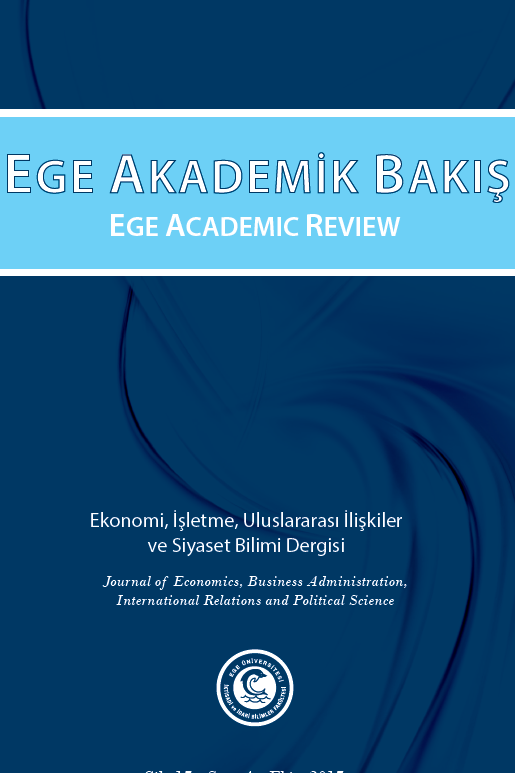Georges Bataille’ın Hegel karşısındaki entelektüel konumu karmaşık bir yapıya sahiptir. Bu karmaşıklık Bataille’ın Hegel karşısındaki konumunu ret veya kabul tercihleriyle sınırlandırmayı imkansız hale getirmektedir. Bataille’ın egemenlik kuramının Fenomenoloji’’nin bir eleştirisi olduğunu anlamak zor değilse de, Bataille’ın egemenliği formüle etmede Fenomenoloji’ye çok şey borçlu olduğu da bir gerçektir. Bu çalışma Bataille ile Hegel arasındaki bu ilişkinin en belirgin olarak ortaya çıktığı yere bakmak istemektedir: köle/efendi diyalektiği. O halde, çalışmanın temel çıkış noktası Bataille’ın egemenliği ile köle/efendi diyalektiğini birlikte okumanın ortaya koyacağı çıkarımlardır. Bu Bataille’ın egemenlik kavramının köle/efendi diyalektiğini ne derecede aydınlattığını göstermekle kalmayacak, aynı zamanda Bataille’ın Hegel ile karşılaşmasının onun egemenliği formüle etmesini nasıl etkilediğini de ortaya koyacaktır
Anahtar Kelimeler:
Georges Bataille, Hegel, egemenlik
Hegel and Georges Bataille’s Conceptualization of Sovereignty
Georges Bataille’s intellectual attitude toward Hegel implies a certain complex structure. This makes it difficult to posit Bataille’s attitude as endorsement or rejection of Hegel. Even if it is possible to infer that Bataille’s formulation of sovereignty directly challenges Hegel’s Phenomenology, we can still realize that in Bataille’s sovereignty, the crucial part is played by the insights taken from Phenomenology. This study tries to look at where this relationship finds its clearest expression: slave/master dialectics. The main concern of this study, therefore, consists in analyzing the insights which we realize when we put slave/master dialectic and Bataille’s sovereignty side by side. This shows not only how Bataille’s sovereignty enlightens slave/master dialectics, but also how Bataille’s encounter with Hegel conditions his formulation of sovereignty
Keywords:
Georges Bataille, Hegel, sovereignty,
___
- Baugh, B. (2003) French Hegel: From Surrealism to Postmodern- ism, 1st edition, New York, Routledge.
- Bataille, G. (1972) L’Expérience Intérieure, 3rd edition, Paris, Gallimard.
- Bataille, G. (1976) La Souveraineté Œuvres Complètes VIII, 1st edition, Paris, Gallimard.
- Bataille, G. (1988) “Hegel, l’Homme et l’Histoire” Œuvres Complètes XII : Articles II 1950-1961, 1st edition, Paris, Gallimard.
- Bataille, G. (1988) “Hegel, la Mort et Le Sacrifice” Œuvres Complètes XII : Articles II 1950-1961, 1st edition, Paris, Gallimard.
- Bennington, G. (1995) “Introduction to Economics I: Because World is Round” Carolyn Bailey Gill (eds.) Bataille: Writing the Sacred, 1st edition, New York, Routledge.
- Bloch, M. (1961) Les Rois Thaumaturges: Étude sur le Caractè Surnaturel Attribué à la Puissance Royale Particulièrement en France et en Angleterre, 4th edition, Paris, Armand Colin.
- Carse, J. (1980) Death and Existence: A Conceptual Study of Human Mortality, 1st edition, New York, John Wiley and Sons.
- Corn, T. (1995) “Unemployed Negativity: Derrida, Bataille, Hegel” Bold-Irons Leslie (eds.) On Bataille: Critical Essays, 1st edition, New York, New York State University Press.
- Frazer, J. G. (1963) The Golden Bough: A Study in Magic and Religion, 5th edition, New York, The Macmillan Company.
- Gasché, R. (1978) System und Metaphorik in der Philosophie von Georges Bataille, 1st edition, Bern, Peter Lang.
- Heidegger, M. (1986) Sein und Zeit, 10th edition, Tubingen, Max Nieyer Verlag.
- Hegel, G. W. F. (1977) Phenomenology of Spirit (trans.: A.V. Miller), Oxford, Oxford University Press.
- Kessel, M. (1998) “A Sovereign’s Anatomy: The Antique in Bataille’s Modernity and Its Impact on His Political Thought” Slavoj Zizek (eds.) Cogito and the Consciousness, 1st edition, London, Duke University Press.
- Kojève, A. (1973) “The Idea of Death in the Philosophy of Hegel” (trans.: Joseph J. Caprino) Interpretation, 114-142.
- Richardson, M. (1994) Georges Bataille, 1st edition, New York, Routledge.
- Schmitt, C. (1996) Politische Theologie: Vier Kapitel zur Lehre von der Souveränität, 6th edition, Berlin, Duncker & Hum- blot.
- Veblen, T. (1953) The Theory of the Leisure Class. An Economic Study of Institutions, 5th edition, New York, Mentor Book..
- ISSN: 1303-099X
- Yayın Aralığı: Yılda 4 Sayı
- Başlangıç: 2000
- Yayıncı: Ege Üniversitesi
